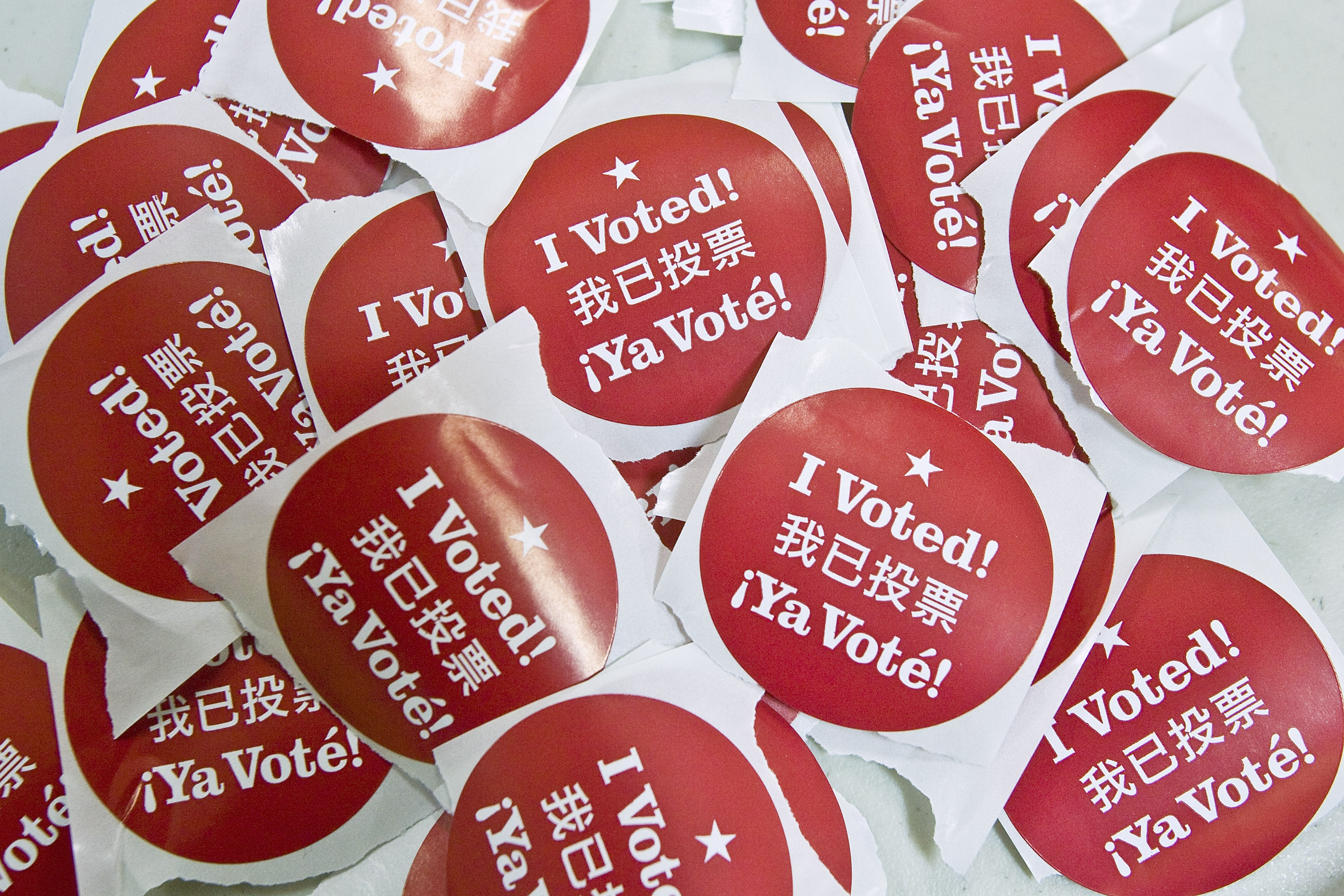Can the GOP escape its destiny of demographic disaster?
It won't be easy. But it can be done.

"Demography is destiny," wrote Ben Wattenberg and Richard Scammon in their 1970 book The Real Majority, perhaps the first formal warning in American politics that political parties had to pay heed to changing populations. And while The Real Majority served as a warning to both major parties, the argument that demography is destiny has most recently been applied to the Republican Party's sputtering attempts to appeal to an increasingly diverse American electorate.
A broad study by Pew Research Center of U.S. demographics recently highlighted the potential danger for the GOP. The fastest growing ethnic group in the U.S. is also the youngest. Over a quarter (26 percent) of U.S.-born Hispanics are millennials, nearly identical to blacks and Asians (25 percent), while only 20 percent of U.S.-born whites are millennials. More significantly, about a third of all Hispanics are under the age of 18 (32 percent), a larger share than African-Americans (26 percent), and much larger than Asians (20 percent) and whites (19 percent). The percentage of Baby Boomer whites nearly doubles that of Hispanics (27 percent to 14 percent), and more than triples that in the previous generation (13 percent to 4 percent).
"For the nation's Hispanic population, youth is a defining characteristic," Pew's Eileen Patten writes. "[A]mong the nation's millennials, Hispanics are a greater share than they are among all American adults — Hispanics make up 21 percent of all U.S. millennials versus 15 percent of all adults in 2014." With the next generation even more significant, Hispanic influence on American culture — and politics — will grow stronger over the next several decades.
The Week
Escape your echo chamber. Get the facts behind the news, plus analysis from multiple perspectives.

Sign up for The Week's Free Newsletters
From our morning news briefing to a weekly Good News Newsletter, get the best of The Week delivered directly to your inbox.
From our morning news briefing to a weekly Good News Newsletter, get the best of The Week delivered directly to your inbox.
What does that have to do with the Republican Party? Plenty, argues The Washington Post's Chris Cillizza. He cites data from a December analysis by David Wasserman about the changing nature of the electorate and the GOP's struggle to keep up. "In 1980, Ronald Reagan won 56 percent of all white voters and won election in a 44-state landslide," Wasserman points out. "In 2012, GOP nominee Mitt Romney carried 59 percent of all white voters yet lost decisively." The difference was that the overall percentage of the white vote declined in the intervening 32 years. "African Americans, Latinos, Asians, and other non-whites — all overwhelmingly Democratic-leaning groups — rose from 12 percent of voters in 1980 to 28 percent in 2012."
Cillizza concludes that the GOP is headed for electoral disaster at the national level. "If nothing changes — in terms of the booming growth among non-white voters and the GOP's inability to communicate with them — the 2016 election may only be the tip of the demographic iceberg for Republicans," Cillizza warns. "The 2020 and 2024 presidential elections could be blowouts."
If nothing changes is a large caveat. The demographic developments won't reverse themselves, but the nature of the electorate does not necessarily depend on demographics. It depends on political movements and their ability to connect with voters and communities, build trust, and deliver on their promises.
The key question is this: Can Republicans change?
A free daily email with the biggest news stories of the day – and the best features from TheWeek.com
Romney only won 27 percent of the Hispanic vote in the 2012 election, according to exit polling, and only 6 percent of African-American votes. But Romney's loss didn't result from shifting demographics as much as it did from a lack of a strategy to address these communities. George W. Bush won a majority of the popular vote and a second term as president eight years earlier while winning 44 percent of the Hispanic vote, improving from 35 percent in 2000. (He won 11 percent of the African-American vote, too). Bush had a strategy that effectively engaged Hispanics when they comprised 8 percent of the overall vote, while Romney clearly did not when they accounted for 10 percent of the overall vote.
The issue for the GOP and its presidential nominees in addressing these demographic changes is one of bridging a disconnect that exists not just with Hispanics, but also with African-Americans, Asians, and younger voters in general. The RNC itself concluded in its "autopsy" after the 2012 election that Republican outreach efforts had been temporary, inadequate, and in many cases counter-productive. (And of course, anti-minority rhetoric of the sort regularly spouted by Donald Trump sure isn't helping matters.)
In researching my book Going Red, I spoke with people in minority communities who echoed those findings, but went further. Too often, Republican campaigns treat these communities almost as destinations for anthropological research rather than as communities to engage and embrace. In the past two election cycles, the GOP dispensed with the kind of peer-to-peer politics at which Barack Obama excelled in favor of national messaging that sounded too much like lectures.
And too often, the GOP remained ignorant of the specific Hispanic communities it tried to address, offering the same message to voters of Mexican, Puerto Rican, Colombian, Venezuelan, and Central American descent. Voters in these ethnic groups have many common interests, but they're often as different as white Americans of Italian and Irish descent. Plus, much depends on where in the country they live. Hispanics in Jefferson County, Colorado, for instance, have roots that go back generations, and as such are not focusing on immigration as much as they are issues at play in their lives now. State Rep. Jon Keyser calls them "the four Es" — the economy, education, energy, and the environment. "I hope that we don't have presidential candidates that come to Jeffco and just want to talk about illegal immigration," Keyser told me.
People in these communities want honest engagement, even when potential disagreements arise. E.J. Otero, a retired Air Force colonel who became the first Hispanic to win a major-party nomination to Congress from West Tampa, expressed his frustration when fellow Republicans don't show up to compete. "You're not going to [win] as a Republican and have a TV ad and say Vote for me because I'm a great guy," Otero explains about West Tampa, "and not go to their local meetings in their neighborhoods. It all comes down to the handshake."
Engagement won't eliminate the challenge Republicans face from changing demographics overnight, but it will open the door to perhaps allowing them to compete more effectively than in the previous two election cycles. More importantly, it will force them to compete more broadly for conservative and Republican values by contextualizing them in the lives of these communities. That will at least give Republicans the opportunity to avoid becoming passive victims of a demographic "disaster."
Edward Morrissey has been writing about politics since 2003 in his blog, Captain's Quarters, and now writes for HotAir.com. His columns have appeared in the Washington Post, the New York Post, The New York Sun, the Washington Times, and other newspapers. Morrissey has a daily Internet talk show on politics and culture at Hot Air. Since 2004, Morrissey has had a weekend talk radio show in the Minneapolis/St. Paul area and often fills in as a guest on Salem Radio Network's nationally-syndicated shows. He lives in the Twin Cities area of Minnesota with his wife, son and daughter-in-law, and his two granddaughters. Morrissey's new book, GOING RED, will be published by Crown Forum on April 5, 2016.
-
 The 8 best biopic movies of the 21st century (so far!)
The 8 best biopic movies of the 21st century (so far!)the week recommends Not all true stories are feel good tales, but the best biopics offer insight into broader social and political trends
-
 Washington grapples with ICE’s growing footprint — and future
Washington grapples with ICE’s growing footprint — and futureTALKING POINTS The deadly provocations of federal officers in Minnesota have put ICE back in the national spotlight
-
 ‘One day fentanyl will come back — and there will be little anyone can do’
‘One day fentanyl will come back — and there will be little anyone can do’Instant Opinion Opinion, comment and editorials of the day
-
 The billionaires’ wealth tax: a catastrophe for California?
The billionaires’ wealth tax: a catastrophe for California?Talking Point Peter Thiel and Larry Page preparing to change state residency
-
 Bari Weiss’ ‘60 Minutes’ scandal is about more than one report
Bari Weiss’ ‘60 Minutes’ scandal is about more than one reportIN THE SPOTLIGHT By blocking an approved segment on a controversial prison holding US deportees in El Salvador, the editor-in-chief of CBS News has become the main story
-
 Has Zohran Mamdani shown the Democrats how to win again?
Has Zohran Mamdani shown the Democrats how to win again?Today’s Big Question New York City mayoral election touted as victory for left-wing populists but moderate centrist wins elsewhere present more complex path for Democratic Party
-
 Millions turn out for anti-Trump ‘No Kings’ rallies
Millions turn out for anti-Trump ‘No Kings’ ralliesSpeed Read An estimated 7 million people participated, 2 million more than at the first ‘No Kings’ protest in June
-
 Ghislaine Maxwell: angling for a Trump pardon
Ghislaine Maxwell: angling for a Trump pardonTalking Point Convicted sex trafficker's testimony could shed new light on president's links to Jeffrey Epstein
-
 The last words and final moments of 40 presidents
The last words and final moments of 40 presidentsThe Explainer Some are eloquent quotes worthy of the holders of the highest office in the nation, and others... aren't
-
 The JFK files: the truth at last?
The JFK files: the truth at last?In The Spotlight More than 64,000 previously classified documents relating the 1963 assassination of John F. Kennedy have been released by the Trump administration
-
 'Seriously, not literally': how should the world take Donald Trump?
'Seriously, not literally': how should the world take Donald Trump?Today's big question White House rhetoric and reality look likely to become increasingly blurred
